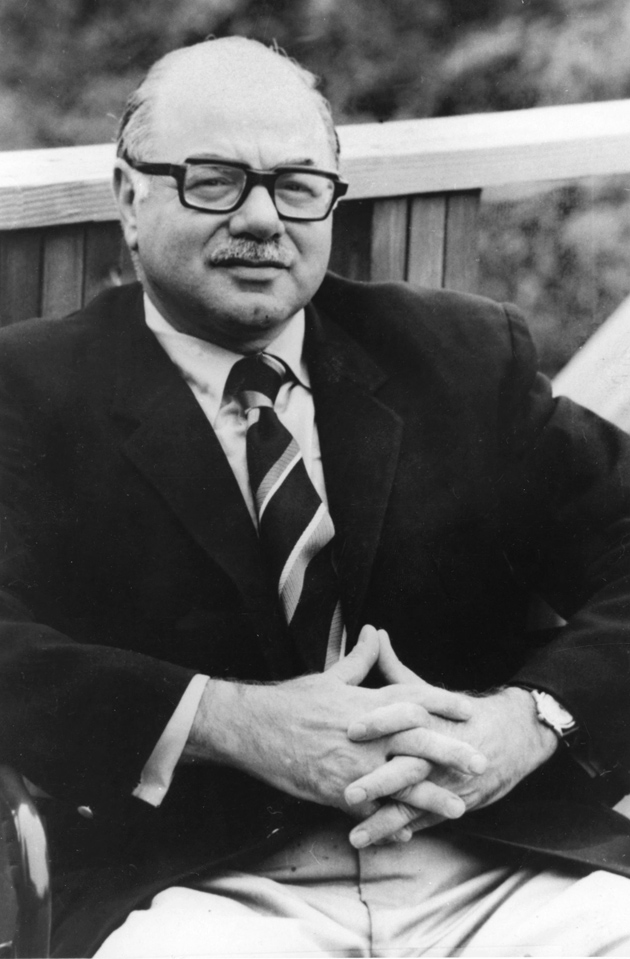It is a great advantage in life to have had a god that failed. Nothing human, and certainly nothing modern, will be alien to you.
Daniel Bell’s god that failed was Marxian socialism. My god that failed was God. When I first met Dan at Harvard in 1979 I had just emerged from the haze of Pentecostal fanaticism that clouded my adolescence and early twenties. I knew and had read nothing except the Bible, which I had absorbed, not studied. There were good teachers in college but no one like Dan, who had a passion for conversation alien to a midwestern gentile. I spent a lot of time in his office that year, and the next, mostly listening and taking notes while he digressed from his digressions and gave me my education. He was not in great demand. The neo-Marxist grad students stayed away because he challenged them, and they resented being read quotations from the Marx-Engels Gesamtausgabe, which was just behind Dan’s desk. They also couldn’t figure out why, when they went in to discuss revolutionary theory, he turned the conversation to gnosticism and hidden messiahs and Kabala. To me, it all made perfect sense. He spoke my language.
Dan’s political conversion took place at the age of thirteen, as did mine. That was when he announced to the rabbi preparing him for his bar mitzvah that he was a socialist and no longer believed in God. (“You think God cares?” was the reply.) He was never a Communist and had zero illusions about the muzhik utopia being constructed on the Great Steppe. A few years after he joined the Young People’s Socialist League, the Moscow show trials began, and not long after that the Hitler–Stalin pact was signed, and not long after that Trotsky lay in a pool of blood in a Mexican villa, an ice pick buried in his skull. Dan’s illusions were intellectual and short-lived. Growing up in the 1930s, he felt the need to make sense of a present that made no sense at all. And Marxism made everything connect.
Making it all connect was the grand ambition of the nineteenth-century system builders whose multivolume masterworks on Nature and History now lie unread in library basements. On or about August 1914, that ambition died in Europe—or nearly. While in the arts all that was left of history was shards, Marx, a half-forgotten man in 1914, was given a second life by the unlikely success of the Russian Revolution and, a decade later, by the discovery of his 1844 Manuscripts, which added a patina of humanism to his unforgiving materialism. An intellectual cult grew up around this archaic nineteenth-century prophet, and for a very short time Dan belonged to it. While he was editing the socialist magazine The New Leader during World War II he spent evenings in the New York Public Library writing his own systematic work, which would expose corporate capitalism’s iron grip on modern society. After writing 150 pages, he tossed it aside. “Who am I kidding?” he thought, and gave his Marxism a quick, respectful burial.
That experience turned Dan into an engaged cold war liberal. His opposition to Communist totalitarianism was not only political, it was based on the intellectual insight that the nineteenth-century aspiration to interpret society with a single set of laws was in principle misconceived. The world just isn’t like that; and besides, the principles we apply to it are only “conceptual schemes” of our own, they are not laws of Nature or History. Yes, everything matters. But everything doesn’t connect: that was Dan’s negative epiphany. In his classic works of sociology, The Coming of Post-Industrial Society (1973) and The Cultural Contradictions of Capitalism (1976), he showed that modern societies are structurally plural, constituted of different spheres of activity—political, technical-economic, cultural—that operate according to different logics, change at different rates, and can conflict with one another. The great contradiction in modern capitalist societies is that antibourgeois cultural hedonism is set against bourgeois economic hedonism, and both are at war with the ascetic Protestant ideal capitalism was originally founded on. Marxism denies this pluralism in theory; communism denies it in fact, with monstrous results.
But why did so many, for so long, invest so much in Marx and the murderous regimes he inspired? Why did class warfare and revolutionary violence thrill rather than disgust them? What was the attraction of belonging to an intellectual elite that possessed a concealed truth? This is what our conversations over thirty years always seemed to turn to. When Dan wrote about “the end of ideology” in the 1960s he only meant the failure of the Marxist tradition to make sense of contemporary society. His real subject, from the 1950s onward, was actually the persistence of ideology, its polymorphous perversity, and its deep affinities with the psychodynamics of religion. Max Weber once called himself “religiously unmusical,” which was a brave thing to say because it was true. Dan had the theological equivalent of perfect pitch, a very rare thing.
Advertisement
His perspective on modern ideology was distinctly Jewish. It’s striking that Christian writers who have explored it—Dostoevsky, Conrad, Miłosz—have written stories about lone individuals grappling with a secular faith. Dan was a New York Jew who saw religion as primarily a social experience. And he took from Jewish experience the conviction that a society can give individuals a secure sense of meaning only if it gives them a secure sense of belonging to a community rooted in time. Religion does that explicitly, but it can also be accomplished through a secular sense of “the sacred,” a shared understanding of what is of ultimate value, of obligations that must be met and lines that must never be crossed. Every healthy society, in Dan’s view, needs some sort of orthodoxy.
But orthodoxies are inherently unstable. Something in the soul resists limits and the tyranny of time, and seeks release in transgression or transcendence. Every orthodoxy brings in its train heterodoxies and heresies that would destroy it; the more rigid the orthodoxy, the more they are likely to prevail. “It is a profound truth that a well-ordered house is a dangerous thing.” That was how Gershom Scholem, whose books left a deep mark on Dan’s thinking, and my own, explained the persistence of the messianic urge in Jewish history. And it is how Dan came to see the occult power of political messianism in the modern West, and the attraction of Marxism in particular, an ideology that gave its adepts both the frisson of transgression against bourgeois propriety and assurance of eschatological redemption through revolution.
Dan once developed this idea in a masterful essay on the Marxist writer Georg Lukács, one of the best things he ever wrote. For him, Lukács was an exemplary twentieth-century figure: a well-off Budapest Jew and Nietzschean aesthete who joined the Communist Party in 1918, Lukács then served as a commissar in the short-lived Hungarian Soviet Republic, touting the gospel that “terror and bloodshed are a moral duty.” He loathed the bourgeois beyond all measure and loved the Party even more. Despite years of abject exile in Stalin’s Moscow avoiding purges (it’s estimated that 80 percent of the Hungarian exiles in the Soviet Union were murdered), and despite the crushing of the Hungarian Revolution in 1956, he never lost his faith in communism, telling an interviewer just before his death that “the Russian Revolution was the world historical solution to my dilemma” and that “even the worst socialism is better than the best capitalism.”
This was in 1971, when the New Left was just discovering Lukács’s works and elevating him to the office of prophet. Dan found nothing surprising in that turn. “The secret of Lukács’s appeal to the Western intelligentsia,” he wrote, “is the concealed history of heresy, the repudiation of common sense and conventional morality, and the creation of an esoteric doctrine and a Gnostic faith for an inner élite.” Besides, “what mystagogue is not also a military commander in his dreams?”
It’s impossible for me to calculate how much I owe Dan, but these particular lessons stand out. I learned that what converts seek in faith is warmth, not light, and that when scales fall from eyes, harder, more opaque ones grow back in. I learned that an epiphany is not an argument, it is a license, usually to destroy. And I learned that when belief in a divinity gives way, a reserve army of idols stands ready to take its place—ideas, dogmas, leaders, movements. Aren’t these lessons a preparation for modern history? Aren’t they a preparation for the present? The end of ideology will not take place; that’s why Daniel Bell’s writings will always be contemporary.
This Issue
April 7, 2011




